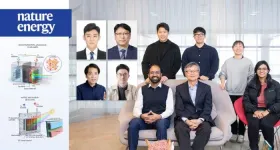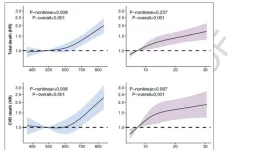(Press-News.org) Wading through the staggering amount of social media content being produced every second to find the nastiest bits is no task for humans alone.
Even with the newest deep-learning tools at their disposal, the employees who identify and review problematic posts can be overwhelmed and often traumatized by what they encounter every day. Gig-working annotators, who analyze and label data to help improve machine learning, can be paid pennies per unit worked.
In a new Concordia-led paper published in IEEE Technology and Society Magazine, researchers argue that supporting these human workers is essential and requires a constant re-evaluation of the techniques and tools they use to identify toxic content.
The authors examine social, policy and technical approaches to automatic toxicity detection and consider their shortcomings while also proposing potential solutions.
“We want to know how well current moderating techniques, which involve both machine learning and human annotators of toxic language, are working,” says Ketra Schmitt, one of the paper’s co-authors and an associate professor with the Centre for Engineering in Society at the Gina Cody School of Engineering and Computer Science.
She believes that human contributions will remain essential to moderation. While existing automated toxicity detection methods can and will improve, none is without error. Human decision-makers are essential to review decisions.
“Moderation efforts would be futile without machine learning because the volume is so enormous. But lost in the hype around artificial intelligence (AI) is the basic fact that machine learning requires a human annotator to work. We cannot remove either humans or the AI.”
Arezo Bodaghi is a research assistant at the Concordia Institute for Information Systems Engineering and the paper’s lead author. “We cannot simply rely on the current evaluation matrix found in machine and deep learning to identify toxic content,” Bodaghi adds. “We need them to be more accurate and multilingual as well.
“We also need them to be very fast, but when machine learning techniques are fast, they can lose accuracy. There is a trade off to be made.”
Broader input from diverse groups will help machine-learning tools become as inclusive and bias free as possible. This includes recruiting workers who are non-English speakers and come from underrepresented groups such as LGBTQ2S+ and racialized communities. Their contributions can help improve the large language models and data sets used by machine-learning tools.
Keeping the online world social
The researchers offer several concrete recommendations companies can take to improve toxicity detection.
First and foremost is improving the working conditions for annotators. Many companies pay them by the unit of work rather than by the hour. Furthermore, these tasks can be easily offshored to workers demanding lower wages than their North American or European counterparts, so companies can wind up paying their employees less than a dollar an hour. And little in the way of mental-health treatment is offered even though these employees are front-line bulwarks against some of the most horrifying online content.
Companies can also deliberately build online platform cultures that prioritize kindness, care and mutual respect as opposed to others such as Gab, 4chan, 8chan and Truth Social that celebrate toxicity.
Improving algorithmic approaches would help large language models reduce the number of errors made around misidentification and differentiating context and language.
Finally, corporate culture at the platform level has an impact at the user level.
When ownership deprioritizes or even eliminates user trust and safety teams, for instance, the effects can be felt company-wide and risk damaging morale and user experience.
“Recent events in the industry show why it is so important to have human workers who are respected, supported, paid decently and have some safety to make their own judgements,” Schmitt concludes.
Benjamin Fung of McGill University’s School of Information Studies also contributed to this study.
Read the cited paper: “Technological Solutions to Online Toxicity: Potential and Pitfalls”
END
Online toxicity can only be countered by humans and machines working together, according to Concordia researchers
Arezo Bodaghi and Ketra Schmitt write that tech companies need to value, trust and support their employees if they want to make the internet a more welcoming place
2024-02-28
ELSE PRESS RELEASES FROM THIS DATE:
SwRI sponsors Future Leaders Program at 2024 ITS America Conference & Expo
2024-02-28
SAN ANTONIO– February 28, 2024 – Southwest Research Institute (SwRI) and ITS Arizona are inviting college students to participate in the Future Leaders Program at this year’s ITS America Conference & Expo, April 22-25, at the Phoenix Convention Center.
The Future Leaders Program allows the next generation of intelligent transportation systems (ITS) leaders to attend education sessions and meet with exhibitors, sponsors and technology providers, all while networking with ITS professionals who can offer career advice and mentorship.
“The ITS industry is continuously looking for smart and creative people to ...
New LOINC® semiannual release highlights health equity work with national and international partners
2024-02-28
LOINC® from Regenstrief Institute’s semiannual content update highlights the comprehensive nature of its work with international partners, including supporting interoperability for prescription drug records, reporting notifiable conditions and standardizing social risk screening tools to represent social determinants of health (SDOH) information in electronic health records (EHRs).
LOINC release 2.77 includes more than 800 new concepts and edits to more than 1,500 concepts. Work captured in the new release includes support for molecular genetic drug and toxicology ...
New study unveils scalable and efficient photoelectrode modules for green hydrogen production
2024-02-28
In a groundbreaking development towards practical photoelectrochemical water splitting, a research team in the School of Energy and Chemical Engineering at UNIST, led by Professors Jae Sung Lee, Ji-Wook Jang, and Sang Il Seok, in collaboration with Professor Hankwon Lim from the Graduate School of Carbon Neutrality at UNIST, has achieved a remarkable technological breakthrough in the production of green hydrogen. Through their innovative approach, the team has overcome the challenges of efficiency, stability, and scalability in photoelectrodes, paving the way for ...
Sedentary behavior increases mortality risk
2024-02-28
Based on decades-long observations of centenarians, author Dan Buettner (Blue Zones) conjectures that people live longer when they get up and move around after sitting for twenty minutes. Now, a rigorous new study published in the Journal of the American Heart Association (JAHA) has data showing that older women who sat for 11.7 hours or more per day increased their risk of death by 30 percent, regardless of whether they exercised vigorously.
Study co-author Steve Nguyen, Ph.D., M.P.H., a postdoctoral fellow at the University of California San Diego Herbert Wertheim School of Public Health and Human Longevity Science, ...
New approach may prevent deadly intestinal disease in preemies
2024-02-28
Scientists from Stanley Manne Children’s Research Institute at Ann & Robert H. Lurie Children’s Hospital of Chicago and colleagues found that an investigational protein replacement – recombinant human insulin-like growth factor 1 and its binding protein-3 (rhIGF-1/BP3) – protected neonatal mice from necrotizing enterocolitis (NEC), a deadly intestinal disease that often strikes extremely premature infants. Results were published in the journal Pediatric Research.
“Our preclinical evidence is encouraging and paves the way to a clinical trial of rhIGF-1/BP3 for prevention of NEC,” said senior author Isabelle De Plaen, MD, a scientist ...
Endocrine Society supports federal legislation protecting IVF access
2024-02-28
WASHINGTON—The Endocrine Society is calling for members of Congress to support federal legislation protecting access to in vitro fertilization (IVF).
The Access to Family Building Act (S.3612/H.R.7056), proposed by Sens. Tammy Duckworth (D-IL), Patty Murray (D-WA), and Rep. Susan Wild (D-PA), would ensure people can access safe, effective IVF and other assisted reproductive technologies to start or grow their families.
Families’ access to IVF services is being threatened by an Alabama State Supreme Court ruling that frozen embryos ...
World’s first metamaterial developed to enable real-time shape and property control
2024-02-28
Inspired by the remarkable adaptability observed in biological organisms like the octopus, a breakthrough has been achieved soft machines. A research team, led by Professor Jiyun Kim in the Department of Materials Science and Engineering at UNIST has successfully developed an encodable multifunctional material that can dynamically tune its shape and mechanical properties in real-time. This groundbreaking metamaterial surpasses the limitations of existing materials, opening up new possibilities for applications in robotics and other fields requiring adaptability.
Current soft machines lack the level of adaptability demonstrated by their ...
Pancreatic cancer lives on mucus
2024-02-28
Knowing exactly what’s inside a tumor can maximize our ability to fight cancer. But that knowledge doesn’t come easy. Tumors are clusters of constantly changing cancer cells. Some become common cancer variants. Others morph into deadlier, drug-resistant varieties. No one truly understands what governs this chaotic behavior.
Now, Cold Spring Harbor Laboratory (CSHL) Professor David Tuveson and his team have uncovered a mechanism involved in pancreatic cancer transformation—mucus. During the disease’s early stage, pancreatic cancer cells produce mucus. Additionally, these cells depend on the body’s regulators of mucus production. This new ...
Want fewer microplastics in your tap water? Try boiling it first
2024-02-28
Nano- and microplastics are seemingly everywhere — water, soil and the air. While many creative strategies have been attempted to get rid of these plastic bits, one unexpectedly effective solution for cleaning up drinking water, specifically, might be as simple as brewing a cup of tea or coffee. As reported in ACS’ Environmental Science & Technology Letters, boiling and filtering calcium-containing tap water could help remove nearly 90% of the nano- and microplastics present.
Contamination of water supplies with nano- and microplastics (NMPs), which can be as small as one thousandth of a millimeter ...
AGA announces 12-point plan to improve the care of all patients with inflammatory bowel disease (IBD)
2024-02-28
Bethesda, MD (Feb. 28, 2024) — Today, the American Gastroenterological Association (AGA) published a white paper on the future of inflammatory bowel disease (IBD) care in the United States. AGA highlights the current barriers to care and calls for collaboration among our healthcare community, insurers, pharmaceutical companies and legislators to improve and optimize care for the more than three million Americans living with IBD.
IBD is a complex disease that requires a vigilant and coordinated multidisciplinary approach. ...
LAST 30 PRESS RELEASES:
GLP-1 drugs associated with reduced need for emergency care for migraine
New knowledge on heritability paves the way for better treatment of people with chronic inflammatory bowel disease
Under the Lens: Microbiologists Nicola Holden and Gil Domingue weigh in on the raw milk debate
Science reveals why you can’t resist a snack – even when you’re full
Kidney cancer study finds belzutifan plus pembrolizumab post-surgery helps patients at high risk for relapse stay cancer-free longer
Alkali cation effects in electrochemical carbon dioxide reduction
Test platforms for charging wireless cars now fit on a bench
$3 million NIH grant funds national study of Medicare Advantage’s benefit expansion into social supports
Amplified Sciences achieves CAP accreditation for cutting-edge diagnostic lab
Fred Hutch announces 12 recipients of the annual Harold M. Weintraub Graduate Student Award
Native forest litter helps rebuild soil life in post-mining landscapes
Mountain soils in arid regions may emit more greenhouse gas as climate shifts, new study finds
Pairing biochar with other soil amendments could unlock stronger gains in soil health
Why do we get a skip in our step when we’re happy? Thank dopamine
UC Irvine scientists uncover cellular mechanism behind muscle repair
Platform to map living brain noninvasively takes next big step
Stress-testing the Cascadia Subduction Zone reveals variability that could impact how earthquakes spread
We may be underestimating the true carbon cost of northern wildfires
Blood test predicts which bladder cancer patients may safely skip surgery
Kennesaw State's Vijay Anand honored as National Academy of Inventors Senior Member
Recovery from whaling reveals the role of age in Humpback reproduction
Can the canny tick help prevent disease like MS and cancer?
Newcomer children show lower rates of emergency department use for non‑urgent conditions, study finds
Cognitive and neuropsychiatric function in former American football players
From trash to climate tech: rubber gloves find new life as carbon capturers materials
A step towards needed treatments for hantaviruses in new molecular map
Boys are more motivated, while girls are more compassionate?
Study identifies opposing roles for IL6 and IL6R in long-term mortality
AI accurately spots medical disorder from privacy-conscious hand images
Transient Pauli blocking for broadband ultrafast optical switching
[Press-News.org] Online toxicity can only be countered by humans and machines working together, according to Concordia researchersArezo Bodaghi and Ketra Schmitt write that tech companies need to value, trust and support their employees if they want to make the internet a more welcoming place







